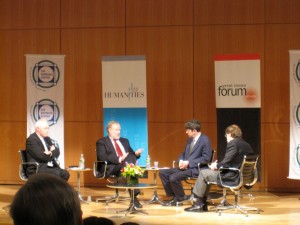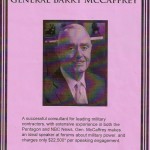 “As a nation we’re waking up from a national drunk,” said Washington Post military correspondent Thomas Ricks at CUNY Graduate Center tonight. Together with the SSRC’s Alex de Waal and retired General Barry McCaffrey, he spoke on “Military Power”—inevitably, the holy trinity of the last decade’s foreign policy disasters: Iraq, Afghanistan, Darfur.
“As a nation we’re waking up from a national drunk,” said Washington Post military correspondent Thomas Ricks at CUNY Graduate Center tonight. Together with the SSRC’s Alex de Waal and retired General Barry McCaffrey, he spoke on “Military Power”—inevitably, the holy trinity of the last decade’s foreign policy disasters: Iraq, Afghanistan, Darfur.
Early in the discussion, purple fliers were handed out advertising McCaffrey as a public speaker and military industry consultant. The young woman handing them out, wearing a black business suit and a straight face, was quietly apprehended by the security officer who greeted me kindly at the door. Undisturbed, the conversation continued. She would be back.
Each panelist had a carefully calibrated account to offer of What Went Wrong. But, as de Waal pointed out, “We keep deluding ourselves that we learn from history when, quite clearly, we do not.” The hot seat inevitably had to be McCaffrey’s, for of the three he had held the most responsibility as a four-star general up until 1996 (a 2000 New Yorker article accused him of war crimes during the Gulf War). He appears to have spent his retirement, in addition to the consulting and lecture circuit, finding just the right disdain for past decisions to keep himself a credible cheerleader for the military solution for everything—to the point of denouncing civilian control over the military (rightly so, where micromanagement is concerned) and declaring that, in many cases of foreign policy, “th only tool that works is the U.S. armed forces.” He offered, also, cause to pause at his own confidence: “When you pick up military tools, you don’t know”—that is, can’t predict—”the outcome.”
What of “military power” itself, the topic around which CUNY convened this Great Issues Forum? Ultimately, said Ricks, “all solutions are political.” The threat of force is more powerful than force itself. Indeed, the use of force in Iraq and Afghanistan has diminished American power in the world—its ability to pressure murderous regimes in Africa, for instance. One wonders if another mood would have carried the evening if it had taken place in 1946, just after the U.S. skillfully arranged the mass murder of warfare to ensure its own geopolitical dominance.
As the talk concluded, the woman who had handed out the flyers about McCaffrey was back. She charged the stage, screaming something about the general and the military industry, before being quickly apprehended again and taken out a side door. When I followed, a cop ordered me to go the other way.

Upstairs, in the lobby, I found her again. After a few minutes, they let her go, and she was joined by a group of friends. She gave her name as Isabelle MacDonald, and I was told she is associated with a collective called the Paper Tiger Foundation and works for Fairness and Accuracy in Reporting, though she represented only herself in her actions. MacDonald was appalled that CUNY had invited McCaffrey, “a paid spokesman of the arms industry,” to speak at an academic event, to be an authority on a Great Issue, without disclosing his nefarious ties. Apparently she forgets that producing weapons of mass destruction is a perfectly respectable business in America.
Her flier is pretty good. Take a look by clicking the thumbs below. And see the New York Times report on McCaffrey and his role in a Pentagon propaganda network.


Comments
2 responses to “A Civilized Conversation about Militarism”
Interesting and well done.
“Ultimately, said Ricks, ‘all solutions are political.’ ” Or spiritual. Mexicans are fond of saying that US and the world doesn’t have a economic crisis but rather a crisis of values….a spiritual crisis. I know the problems with that word but I like their way of thinking………Quentin
Yeah, that is such a toughie! Because with spiritual things, the powerful can always say, Why don’t you poor folks just solve your problems spiritually and stop bothering me about my responsibility to you? Maybe the fact of all solutions really being spiritual should be kept a secret.